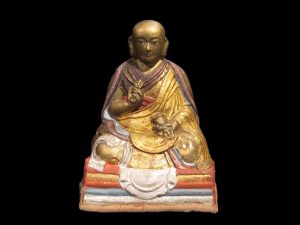Mongolia’s pursuit of its next spiritual leader, the Jebtsundamba Khutuktu, has become a high-stakes game of power and influence behind the scenes, with China’s growing sway casting a shadow over the nation’s religious affairs. The title, representing the highest-ranking lama of Tibetan Buddhism in Mongolia, has been vacant since the 9th Jebtsundamba’s passing in 2012.
Despite the 9th Jebtsundamba’s wish for only the Dalai Lama to recognize his successor, China is seemingly nudging Mongolia to seek its approval before acknowledging a new leader. This tactic is part of China’s broader strategy to control Buddhism beyond its borders, with Mongolia being a crucial piece of the puzzle.
As Buddhism is deeply interwoven with Mongolia’s culture, history, and ideas of sovereignty and democracy, the country’s economic and geopolitical future hangs in the balance.
The Jebtsundamba Khutuktu is the third most important figure in the Tibetan Buddhist hierarchy, and will play an important role in recognizing the next Dalai Lama. China aims to install its own pro-China Dalai Lama, making the 10th Jebtsundamba’s role in the succession crucial.
The current Dalai Lama – whom Beijing views as a dangerous separatist – has visited Mongolia multiple times, identifying several religious nobles and incarnations. During his last visit in 2016, he is believed to have secretly performed the ceremony to identify the new Jebtsundamba, which drew China’s ire and a diplomatic warning. At that time, China imposed fees on commodity imports from Mongolia, charging additional transit costs on goods passing through a border crossing into China’s northern region.
The process of identifying the next Jebtsundamba Khutuktu is fraught with challenges and complexities even outside of China’s involvement. The influence of political intrigue has become entwined with the selection process. In a notable instance, the grandson of a former member of parliament and an influential businesswoman was identified as the 10th Jebtsundamba.
The involvement of prominent political and business figures in the selection raises questions about the transparency and integrity of the process, potentially undermining the spiritual authority of the chosen leader. As a result, the search for the next Jebtsundamba Khutuktu is not only a matter of religious importance but also a reflection of the broader political and social dynamics in Mongolia.
Mongolia must carefully navigate the intricate web of interests and recognize its next spiritual leader with caution. While China may not take trade and economic measures against Mongolia as it did in 2017 following the Dalai Lama’s visit, a strategic approach to this sensitive religious issue is essential.
The quest for the next Jebtsundamba Khutuktu transcends religious significance, becoming a political, economic, and geopolitical battleground.













